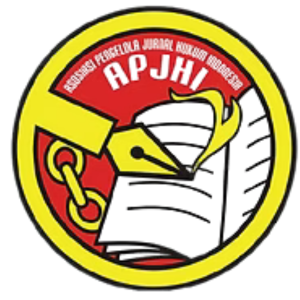Sak Uwong Sak Uwit Policy: Environmental Conservation Strategy
DOI:
https://doi.org/10.21580/walrev.2019.1.2.4825Keywords:
law, social engineering, Policy, conservation, hukum, rekayasa sosial, kebijakan, konservasiAbstract
Development is one of the contributors to global warming, especially industrial development. Industrial companies in Kendal Regency in 2017 there were 61 companies with 25,385 workers. The phenomenal industry in Kendal Regency lately is a Special Industrial Zone (KIK) known as Kendal Industrial park (KIP). Kendal Industri Park (KIP) is the largest industrial development city in Central Java with a total development size of 2,200 hectares. Kawasan Industri Park (KIP) is a joint venture between two industrial developers in Southeast Asia naming Sembcorp Development Ltd and PT Jababeka Tbk. This paper examines the implementation of the Sak Uwong Sak Uwit (SUSU) policy in Kendal District where the policy is in response to global warming. The focus of this study is the implementation of a policy, so the method used is a juridical-empirical legal research method. The focus of his study is looking at the law in terms of law in action not in law in books. The Sak Uwong Sak Uwit (SUSU) policy can be implemented even though it is not yet maximized. The bride and groom have received information about this policy and implemented it, but it is different from the mother giving birth who did not get information about this policy so that for the mother giving birth the program did not work. This policy has been able to move the community (law as a tool of social engineering) to care for the environment by planting trees. By planting these trees environmental conservation will be created.
Pembangunan menjadi salah satu penyumbang terjadinya pemanasan global (global warming), terlebih pembangunan industri. Perusahaan industri di Kabupaten Kendal tahun 2017 tercatat sebanyak 61 perusahaan dengan 25.385 tenaga kerja. Industri yang fenomenal di Kabupaten Kendal akhir-akhir ini adalah Kawasan Industri Khusus (KIK) yang dikenal dengan sebutan Kendal Industri park (KIP). Kendal Industri Park (KIP) ini merupakan pengembangan kota industri terbesar di Jawa Tengah dengan total ukuran pengembangan mencapai 2.200 hektar. Kawasan Industri Park (KIP) merupakan perusahaan patungan antara dua pengembang industri di Asia Tenggara penamaan Sembcorp Pengembangan Ltd dan PT Jababeka Tbk. Penelitian ini mengkaji tentang implementasi kebijakan Sak Uwong Sak Uwit (SUSU) di Kabupaten Kendal di mana kebijakan tersebut sebagai respon terhadap pemanasan global. Fokus kajian ini adalah implementasi dari sebuah kebijakan, sehingga metode yang yang digunakan adalah metode penelitian hukum yuridis-empiris. Fokus kajiannya adalah melihat hukum dari sisi law in action tidak pada law in books. Kebijakan Sak Uwong Sak Uwit (SUSU) dapat diimplementasikan meski belum maksimal. Calon pengantin sudah menerima informasi tentang kebijakan ini dan melaksanakannya, namun berbeda dengan ibu melahirkan yang tidak mendapatkan informasi tentang kebjaka ini sehingga untuk ibu melahirkan program ini tidak berjalan. Kebijakan ini sudah mampu menggerakkan masyarakat (law as a tool of social engineering) untuk peduli lingkungan yaitu dengan menanam pohon. Dengan menanam pohon tersebut konservasi lingkungn akan tercipta.
Downloads
References
Edi, Kuncoro. 2010. Peralihan Tanah Bengkok dan Akibat Hukumnya (Studi Kasus Putusan PN Boyolali Nomor 51/Pdt.G/1999/PN.Bi). Tesis. Semarang: Universitas Diponegoro.
Focus Group Discussion (FGD) ‘Menanam pohon bagi ibu melahirkan’, 20 Agustus 2018.
Focus Group Discussion (FGD) ‘Menanam pohon bagi calon pengantin’, 23 Agustus 2018.
Hanitijo, Ronny. 1990. Metodologi Penelitian Hukum dan Jurimetri. Jakarta: Ghalmia Indonesia.
http://treeday.enoprogramme.org/ diakses pada 14 Agustus 2018.
https://balebengong.id/kabar/ketika-mata-air-jadi-air-mata.html?lang=id, diakses pada 16 September 2018.
https://en.wikipedia.org/wiki/Environment_Online diakses pada Agustus 2018
Badan Pusat Statistik Kabupaten Kendal. 2018. Kabupaten Kendal dalam Angka 2018.
Murdiyarso, Daniel. 2005. Sepuluh Tahun Perjalanan Negosiasi Konvensi Perubahan Iklim. Jakarta: Kompas.
Oxford University. 2009. Oxford Learner’s Pocket Dictionary. Oxford: Oxford University Press.
Panjaitan, Hulman, and Sianipar, Anner Mangatur. 2008. Hukum Penanaman Modal Asing. Jakarta: Ind Hill Co Original.
Peraturan Daerah Kabupaten Kendal Nomor 3 Tahun 2012 Tentang Penanaman Pohon bagi Calon Pengantin dan Ibu Melahirkan di kabupaten Kendal.
Saparinto, Cahyo. 2007. Pendayagunaan Ekosistem Mangrove Mengatasi Kerusakan Wilayah pantai (Abrasi) Meminimalisasi Dampak Gelombang Tsunami, Semarang: Dahara Prize.
Tarigan, Herlina, dkk., 2013. “Persaingan Akses Sumber Daya Air di Yeh Ho, Tabanan, Bali”, Jurnal Agro Ekonomi, 2 (31): 143-159.
United Nations Development Programme (UNDP). 2006. Human Development Report 2006 Beyond Scarcity: Power, Poverty and The Global Water Crisis, New York: UNDP
Interview with Agus Riyanto, 11 Agustus 2018.
Interview with Widya Kandi Susanti, 3 Agustus 2018.
Interview with Sudardi, 22 Agustus 2018.
Interview with Jazuli, 23 Agustus 2018.
Interview with Adib Muhlasin, 23 Agustus 2018.
Interview with Komari, 23 Agustus 2018.
Interview with Miftah Fadlullah, 13 Agustus 2018.
Interview with Muhammad Mushonif, 10 Agustus 2018.
Interview with Mochtar, 5 Agustus 2018.
Interview with Puji Astuti, 21 Agustus 2018.
www.kendalindustrialpark.co.id. diakses 10 September 2018.










